Culture
-
The Ancient Chinese Calendar
2012-11-06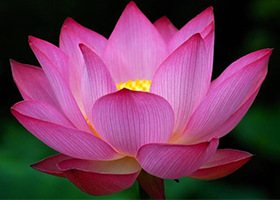 Legends and mythology are a big part of Chinese culture, especially in relation to the Chinese calendar. Chinese people have every reason to be proud of those treasures, although many of them are regarded as myths by modern science. The 12 animals on the Chinese Zodiac calendar are believed to be chosen by a god to represent 12 years, and to continue this cycle every 12 years.
Legends and mythology are a big part of Chinese culture, especially in relation to the Chinese calendar. Chinese people have every reason to be proud of those treasures, although many of them are regarded as myths by modern science. The 12 animals on the Chinese Zodiac calendar are believed to be chosen by a god to represent 12 years, and to continue this cycle every 12 years. -
To Value Virtue Over Wealth
2012-11-02 A trip to the temple to burn incense on New Year’s Day is still a tradition in China. But people’s prayers have changed. Rather than paying respect to the Buddha, people today ask for things, mostly to eliminate hardships and make a fortune. Ancient Chinese traditions taught people to value virtue over wealth. A person who would seek no monetary compensation when doing a good deed was said to receive virtue and attain rewards from an otherworldly realm.
A trip to the temple to burn incense on New Year’s Day is still a tradition in China. But people’s prayers have changed. Rather than paying respect to the Buddha, people today ask for things, mostly to eliminate hardships and make a fortune. Ancient Chinese traditions taught people to value virtue over wealth. A person who would seek no monetary compensation when doing a good deed was said to receive virtue and attain rewards from an otherworldly realm. -
Traditional Chinese Culture: The Art of Teaching in Ancient China Pt2
2012-10-30 In ancient China, education was conducted both in the private sector and by the government. Children were educated at home by private tutors (known as Sishu), scholars who failed central governmental exams. Educating children was an important career path for these intellectuals: it provided a means of livelihood, nurtured their talents, and promoted education in society.
In ancient China, education was conducted both in the private sector and by the government. Children were educated at home by private tutors (known as Sishu), scholars who failed central governmental exams. Educating children was an important career path for these intellectuals: it provided a means of livelihood, nurtured their talents, and promoted education in society. -
Traditional Chinese Culture: The Art of Teaching in Ancient China Pt1
2012-10-26 The root of Confucianism consists of “benevolence, righteousness, propriety, wisdom, faithfulness.” Many virtues, such as loyalty, filial piety, bravery, fairness, transparency, righteousness, diligence, etc. are derived from it. In ancient Chinese society, Confucianism defined the moral values and standards for being a good person.
The root of Confucianism consists of “benevolence, righteousness, propriety, wisdom, faithfulness.” Many virtues, such as loyalty, filial piety, bravery, fairness, transparency, righteousness, diligence, etc. are derived from it. In ancient Chinese society, Confucianism defined the moral values and standards for being a good person. -
Traditional Chinese Culture: The Story Behind the ‘Journey to the West’
2012-10-23 Journey to the West is a major pillar of Chinese literature. Written in the Ming Dynasty (16th century), Journey to the West is one of the Four Great Classical Novels of Chinese literature, the others being Romance of the Three Kingdoms, Water Margin, and Dream of the Red Chamber.
Journey to the West is a major pillar of Chinese literature. Written in the Ming Dynasty (16th century), Journey to the West is one of the Four Great Classical Novels of Chinese literature, the others being Romance of the Three Kingdoms, Water Margin, and Dream of the Red Chamber. -
Stories from Ancient China: Pangu Creates The World
2012-10-19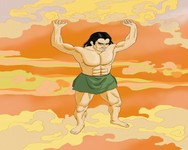 Ancient Chinese myths describe the creation of the universe, the origin of human beings, and the emergence of culture. They are part of the heritage of China’s five thousand years of culture. For example, these ancient myths tell the story of how the earth was formed. In the olden days, parents told their children the universe was created by Pangu.
Ancient Chinese myths describe the creation of the universe, the origin of human beings, and the emergence of culture. They are part of the heritage of China’s five thousand years of culture. For example, these ancient myths tell the story of how the earth was formed. In the olden days, parents told their children the universe was created by Pangu. -
Stories Behind Chinese Idioms: ‘Screened by the Peacock Screen’
2012-10-16 Queen Dou, wife of the founding Emperor of the Tang Dynasty Li Yuan, was as renowned for her beauty as she was for her intellect and wisdom. When Queen Dou was just a little girl, she already demonstrated remarkable foresight and judgement on affairs of the state.
Queen Dou, wife of the founding Emperor of the Tang Dynasty Li Yuan, was as renowned for her beauty as she was for her intellect and wisdom. When Queen Dou was just a little girl, she already demonstrated remarkable foresight and judgement on affairs of the state. -
Stories from Ancient China: With Ethics Foremost, No Grudges Remain
2012-10-12 Wan Quan was a well-respected physician in the Ming. He was born on Hongzhi 11th Year (1498 A.D.) in present-day Luotian County in Hubei Province. Not only was he highly skilled in the noble art of medicine, he was even more admired for his impeccable bedside manners. He was known to be caring and forgiving, and treated all patients equally, holding no grudges for past squabbles.
Wan Quan was a well-respected physician in the Ming. He was born on Hongzhi 11th Year (1498 A.D.) in present-day Luotian County in Hubei Province. Not only was he highly skilled in the noble art of medicine, he was even more admired for his impeccable bedside manners. He was known to be caring and forgiving, and treated all patients equally, holding no grudges for past squabbles. -
Stories from Ancient China: Nu Wa, Creator of Humans
2012-10-09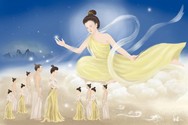 The first batch of clay people made by Nu Wa, were just like puppets, with no life, thought, or movement. Nu Wa was not satisfied with them, so she breathed into the clay people, giving them a soul. Immediately, they transformed into lively human beings.
The first batch of clay people made by Nu Wa, were just like puppets, with no life, thought, or movement. Nu Wa was not satisfied with them, so she breathed into the clay people, giving them a soul. Immediately, they transformed into lively human beings. -
Stories from Ancient China: Fu Xi and the Origin of Chinese Civilization
2012-10-05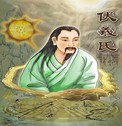 According to Chinese history, gods from heaven imparted culture directly to the Chinese people who Nu Wa had created. The best-known of these gods are Fu Xi and Shen Nong. They were sent down to earth to teach Chinese people basic skills and knowledge and to improve people’s awareness of nature.
According to Chinese history, gods from heaven imparted culture directly to the Chinese people who Nu Wa had created. The best-known of these gods are Fu Xi and Shen Nong. They were sent down to earth to teach Chinese people basic skills and knowledge and to improve people’s awareness of nature. -
The Plum Blossom: A Symbol of Strength
2012-09-28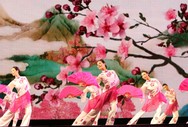 In the midst of winter, before snow melts and the swallow returns, plum trees blossom onto the barren landscape, bracing the harshness of winter and reminding people spring will come. Celebrated here is the vitality of life, endurance through hardship, and hope that life will regenerate.
In the midst of winter, before snow melts and the swallow returns, plum trees blossom onto the barren landscape, bracing the harshness of winter and reminding people spring will come. Celebrated here is the vitality of life, endurance through hardship, and hope that life will regenerate. -
Stories from Ancient China: Shen Nong, Father of Agriculture and Medicine
2012-09-25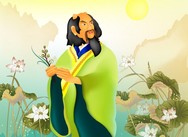 After Fu Xi instituted marriage in society, the population of ancient China gradually grew. Then people encountered new problems. First, they did not know what to eat and what not to eat. Second, they did not know how to heal disease. It is said many died of plague in those days.
After Fu Xi instituted marriage in society, the population of ancient China gradually grew. Then people encountered new problems. First, they did not know what to eat and what not to eat. Second, they did not know how to heal disease. It is said many died of plague in those days. -
Stories from Ancient China: Ancient Chinese Cooled Foods With Ice
2012-09-20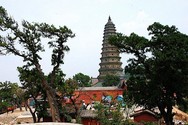 Dating from 147 A.D, Guangsheng Temple near Huoshan Mountain in China’s Shanxi province is renowned for its 13-story “Flying Rainbow Pagoda” and its murals which portray the local populace propitiating the Water God during the Yuan Dynasty (1271-1368).
Dating from 147 A.D, Guangsheng Temple near Huoshan Mountain in China’s Shanxi province is renowned for its 13-story “Flying Rainbow Pagoda” and its murals which portray the local populace propitiating the Water God during the Yuan Dynasty (1271-1368). -
Stories from Ancient China: The Yellow Emperor, Ancestor of Chinese Civilization
2012-09-11 After Shen Nong the Yellow Emperor took responsibility for keeping stability for the whole territory. He led people to settle in the Yellow River Basin and changed their way of life from hunting to building houses, raising livestock and planting crops.
After Shen Nong the Yellow Emperor took responsibility for keeping stability for the whole territory. He led people to settle in the Yellow River Basin and changed their way of life from hunting to building houses, raising livestock and planting crops. -
Stories from Ancient China: Changjie, Creator of Chinese Characters
2012-09-07 One day, while walking in the mountains, Changjie came across a giant turtle. The blue lines on that turtle’s shell drew his attention. He studied the lines carefully and found intrinsic meaning in their patterns. He had the idea that people also could express thoughts and meaning or record things by simple symbols like those on the turtle’s back.
One day, while walking in the mountains, Changjie came across a giant turtle. The blue lines on that turtle’s shell drew his attention. He studied the lines carefully and found intrinsic meaning in their patterns. He had the idea that people also could express thoughts and meaning or record things by simple symbols like those on the turtle’s back.



 more ...
more ...